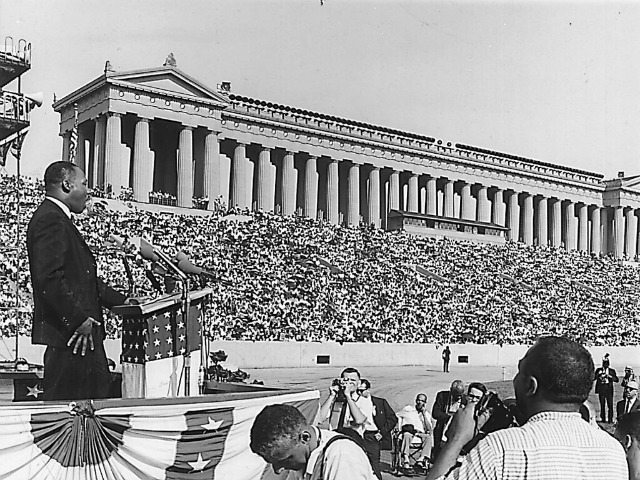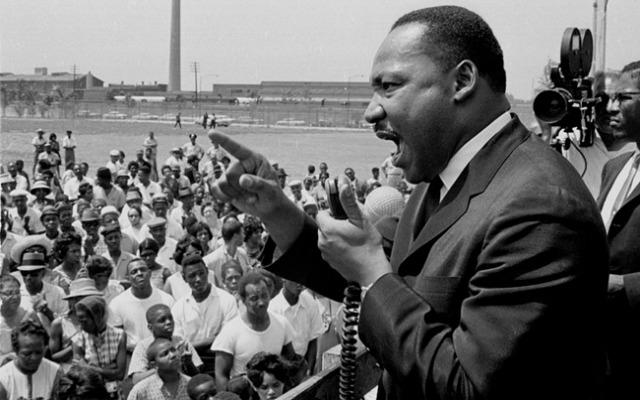Remembering Dr. Martin Luther King Jr.'s Time In Chicago
By Kate Shepherd in News on Jan 18, 2016 9:52PM

MLK Jr. speaking at Soldier Field http://imgur.com/QClMEiP
Dr. Martin Luther King Jr. may be a larger-than-life, historical figure but that doesn't mean he didn't have a huge impact on the streets of Chicago. And the violence he encountered in Chicago had a major effect on his work.
Shortly after stepping out his car on during a visit on Aug. 5, 1966, he was shocked to be hit by a stone which knocked him down to one knee. He had to be shielded from bricks and bottles hurled by the crowd, according to the LA Times.
"I have never seen, even in Mississippi and Alabama, mobs as hateful as I've seen here in Chicago," he told reporters at the time. "Yes, it's definitely a closed society. We're going to make it an open society."
Many current Chicagoans may not realize that he spent time in the city to "work with other likeminded activists to improve the conditions of urban slums, end housing discrimination, and expand access to public schooling," according to UIC's Remembering Richard J. Daley project.
He even rented a West Side apartment and staged marches because Chicago seemed like the perfect battleground, according to the Tribune.
But his work on economic inequality didn't improve conditions for all black Chicagoans even though it definitely made a difference, according to historians.
"There has been and hasn't been change; it depends on how you look at it," Timuel D. Black, a local 97-year-old historian and activist who knew King and protested with him, told the LA Times.
"It made desirable housing and schools more accessible and available" for middle class blacks, according to Black. But it didn't help the people at the bottom.
The blacks who moved to Chicago from the South didn't find the jobs and improved lives they were searching for. Instead they were met with firebombings and squeezed into South and West Side slums.

King at the Robert Taylor Homes. WTTW
Still King's presence in Chicago helped get things done, according to a UIC interview with John Daley, son of Richard J. Daley:
I was at the mayor's office when Dr. King came in. What surprised me the most was - first, the room was filled with ministers, elected officials, his aides, and department heads, and people were talking - but when Dr. King came in, the silence he brought into that room and the command. And he was not a tall man. I was shocked, but I remember the quietness. As soon as he entered the room, it became quiet. And then he sat right across from my dad. They discussed the problems in the city that he came to address. And he said, "Dr. King, we're willing to work with you, we will work this out." And they came up with a plan, my dad and him. They announced it.
It's no shock that Mayor Daley didn't enjoy an outsider like King pointing out Chicago's faults.
"Maybe he doesn't have all the facts on the local situation," the mayor said, according to the Tribune. "After all, he is a resident of another city."